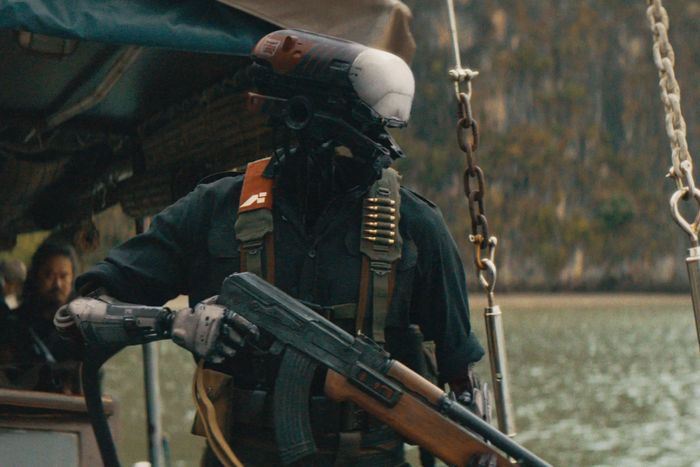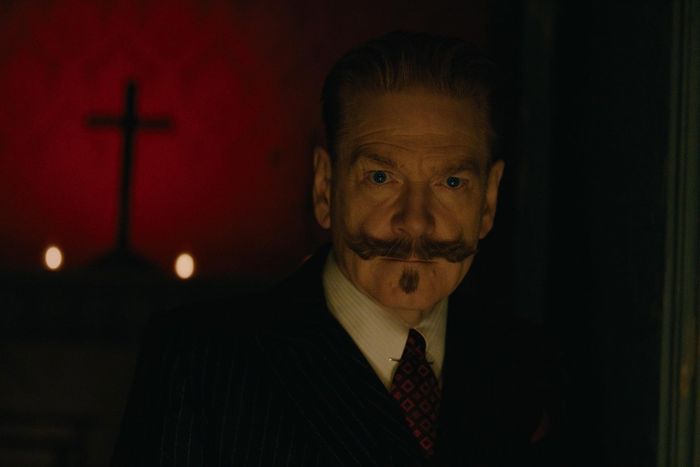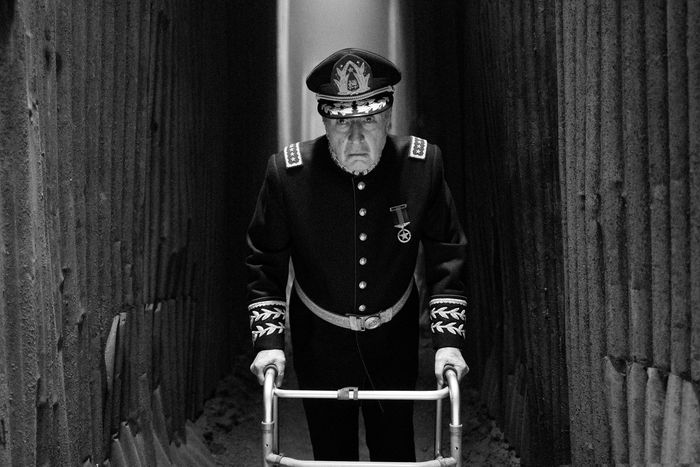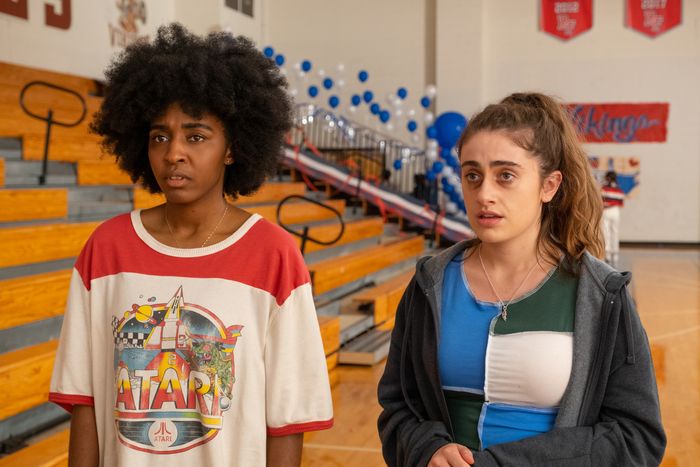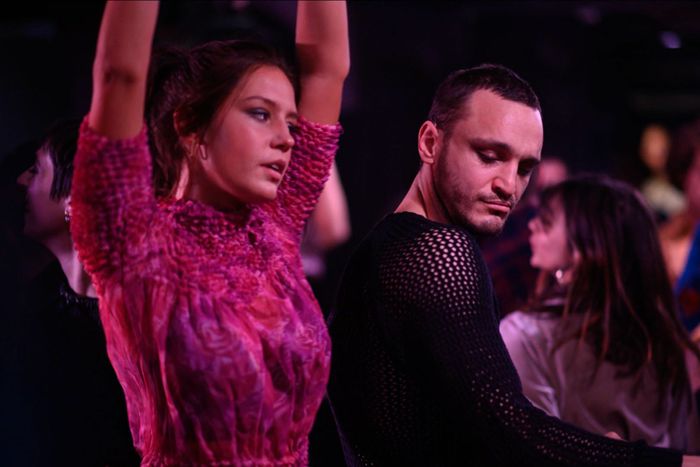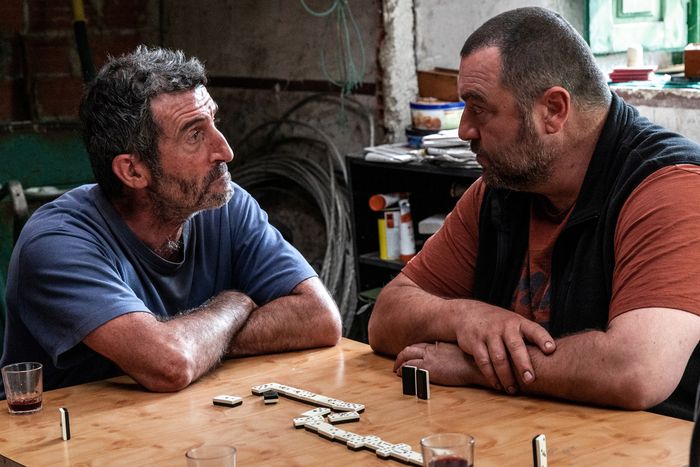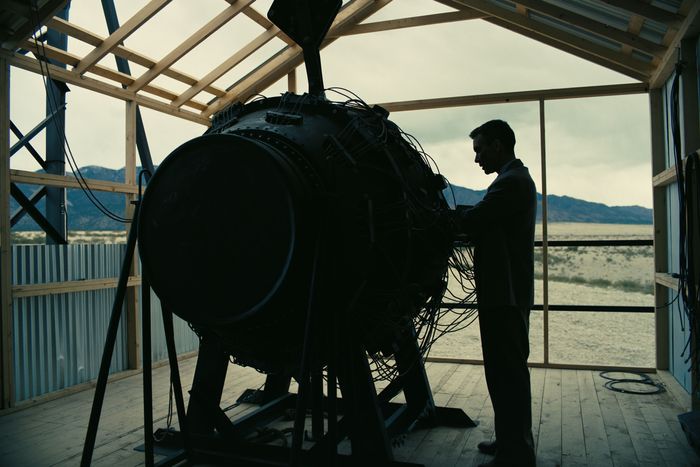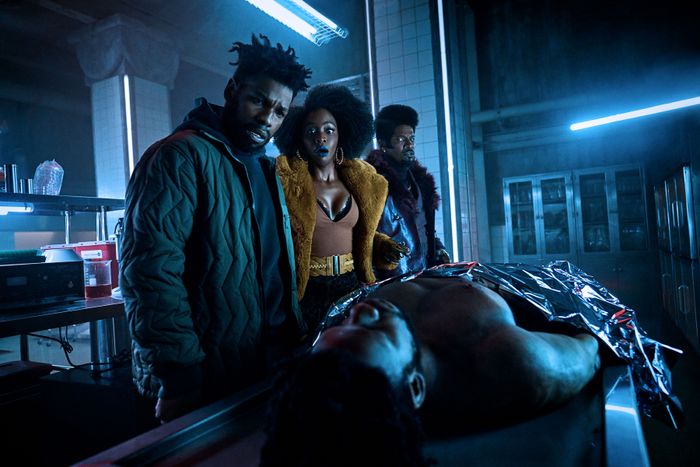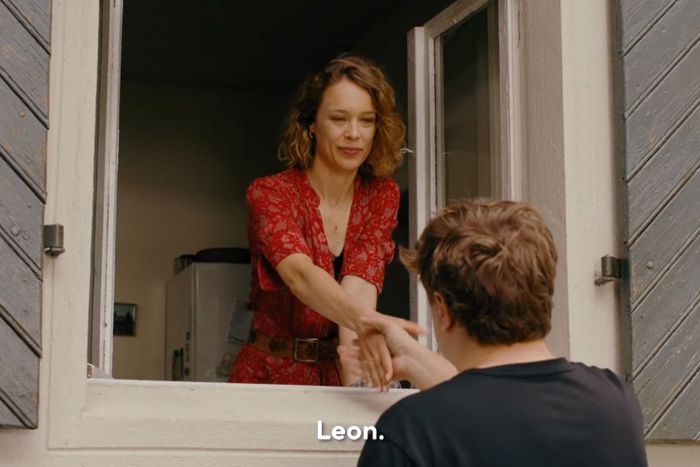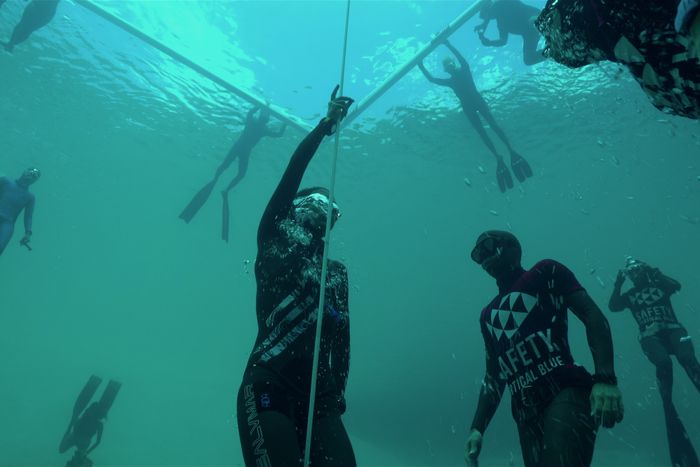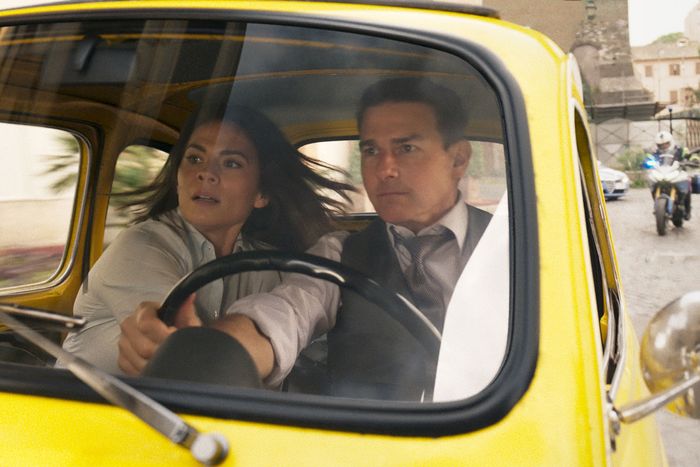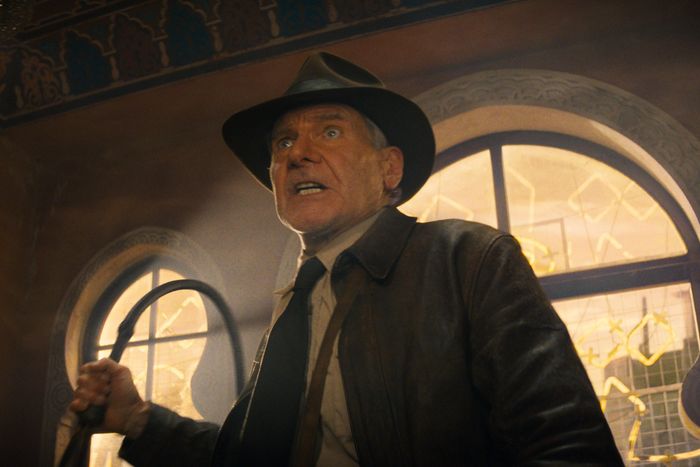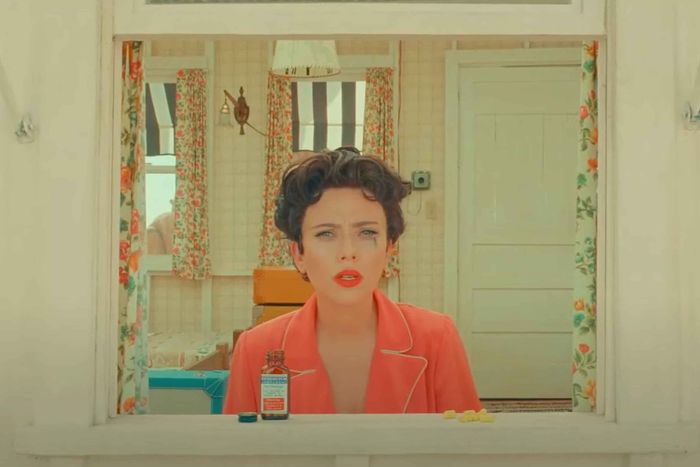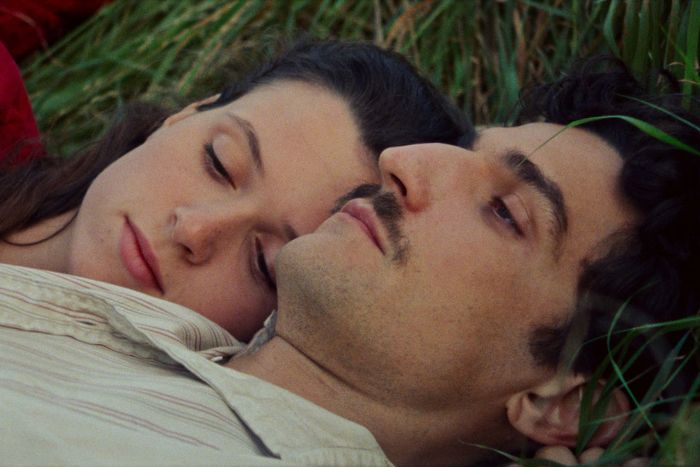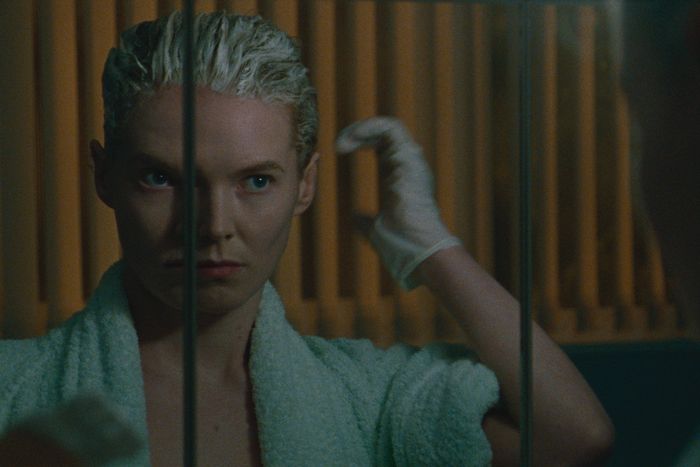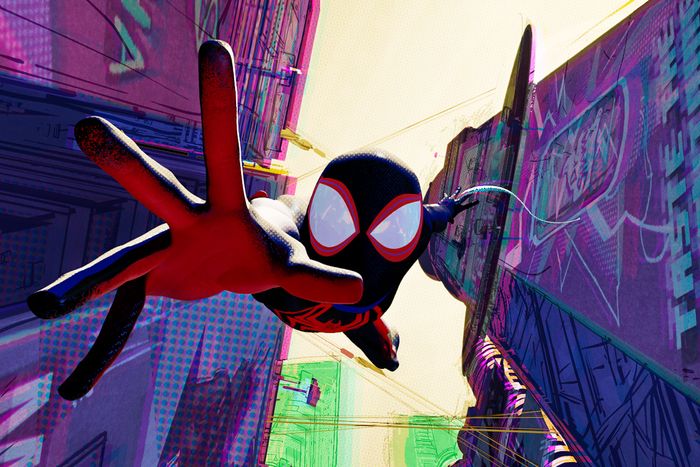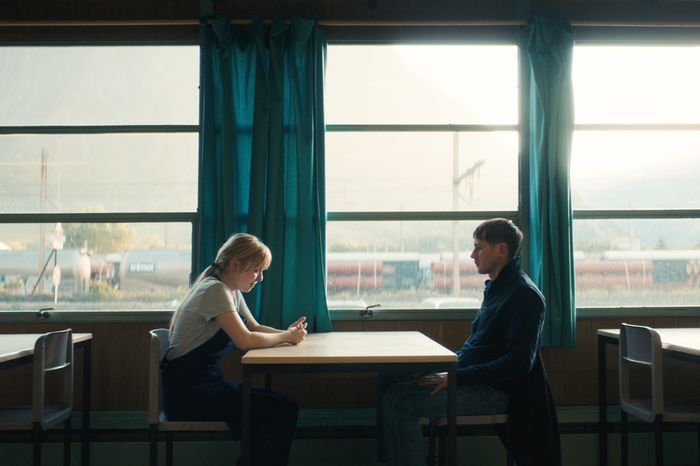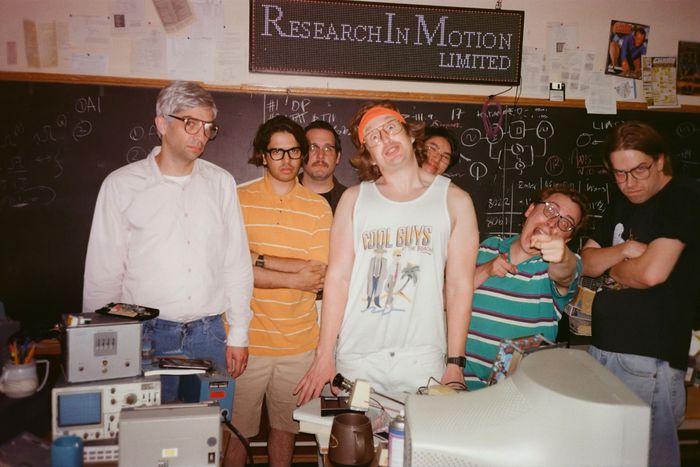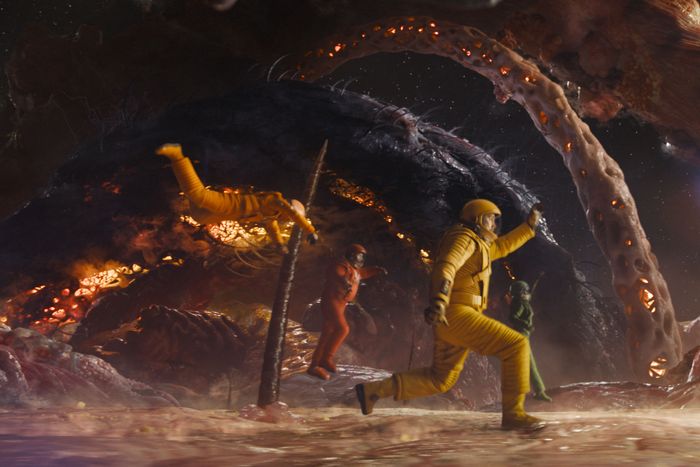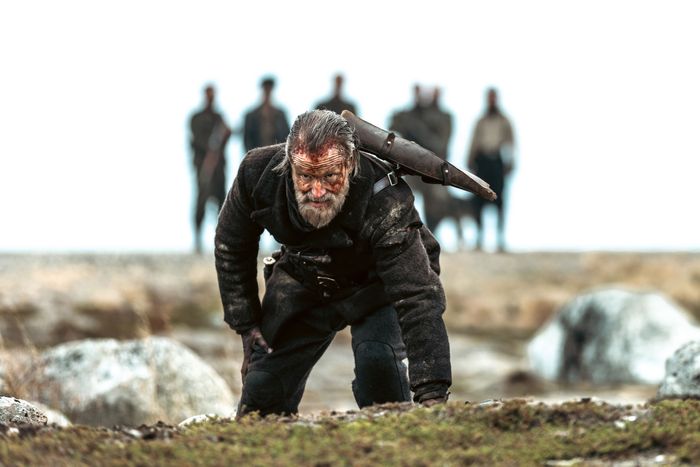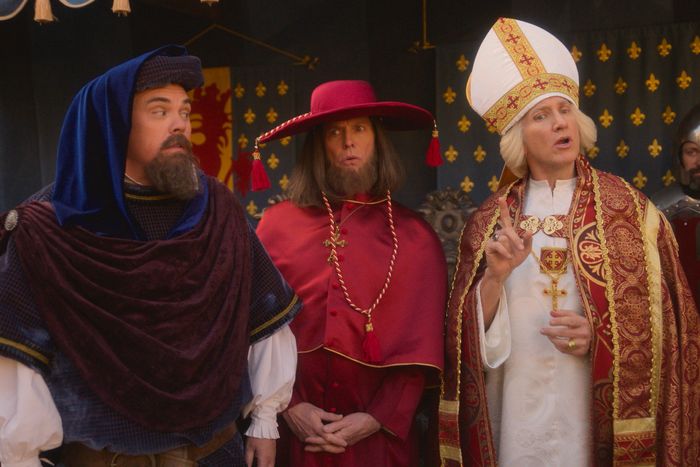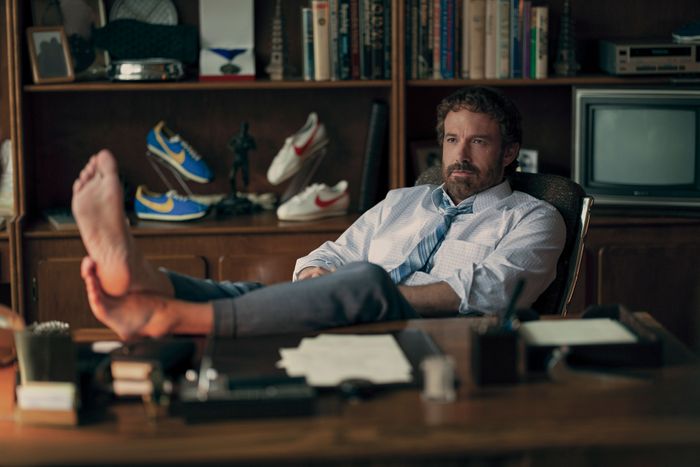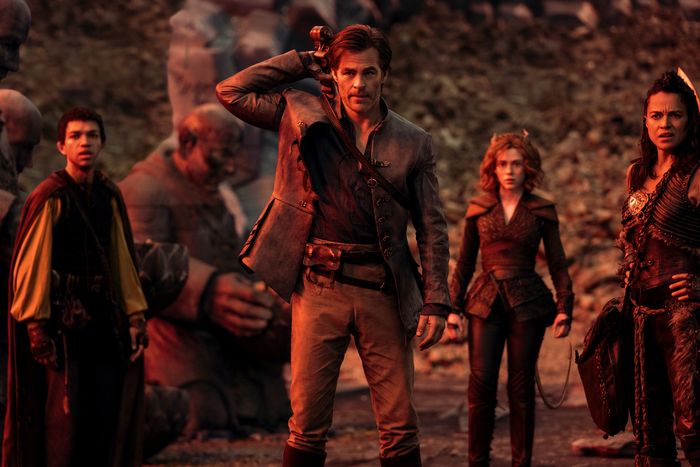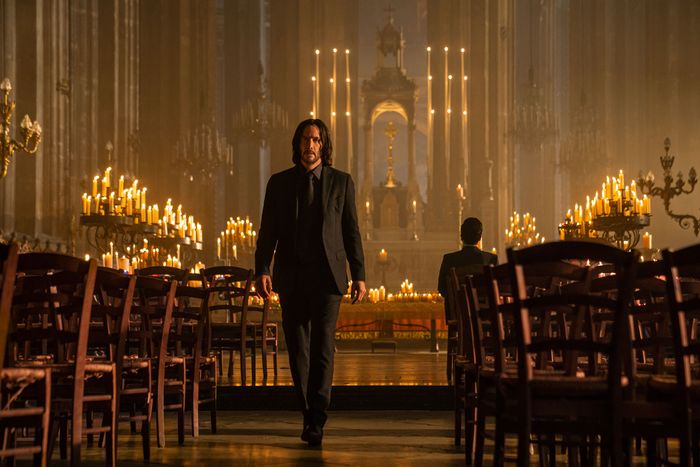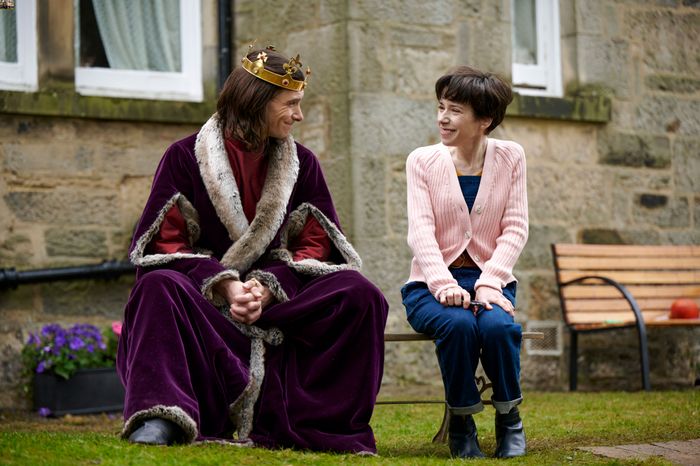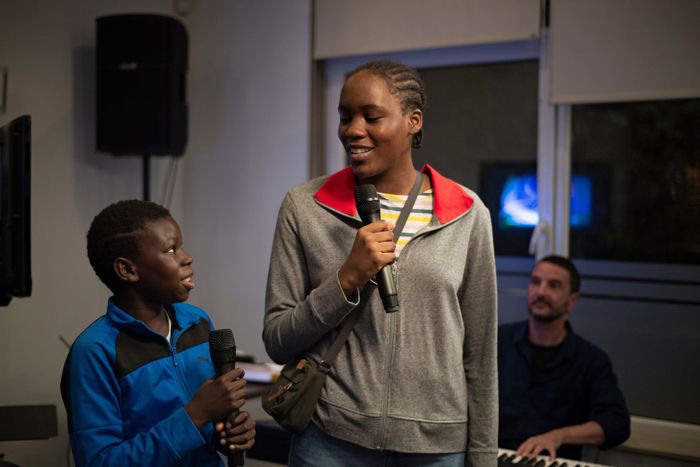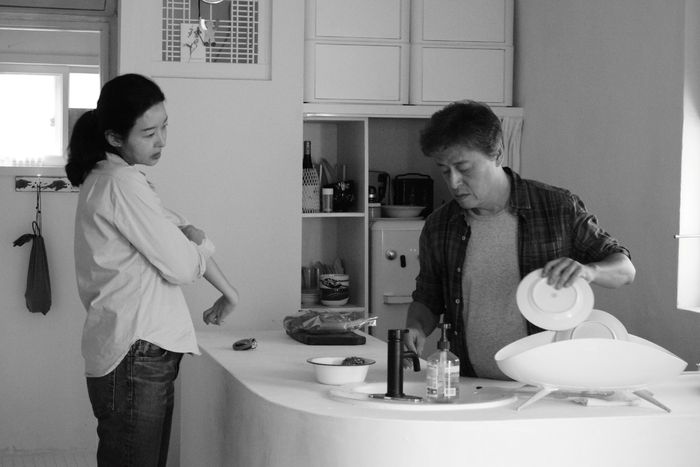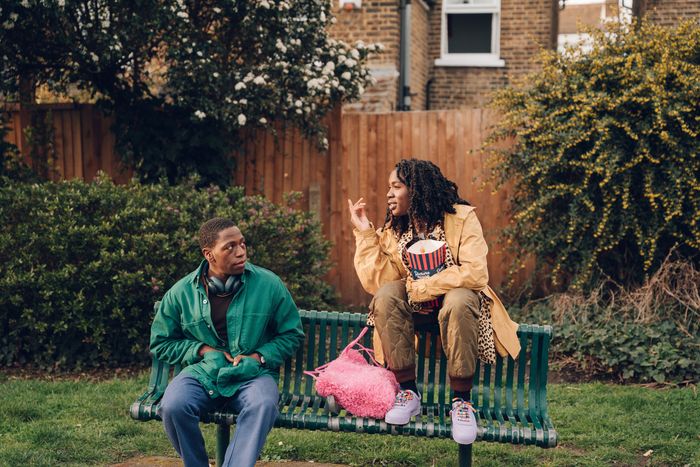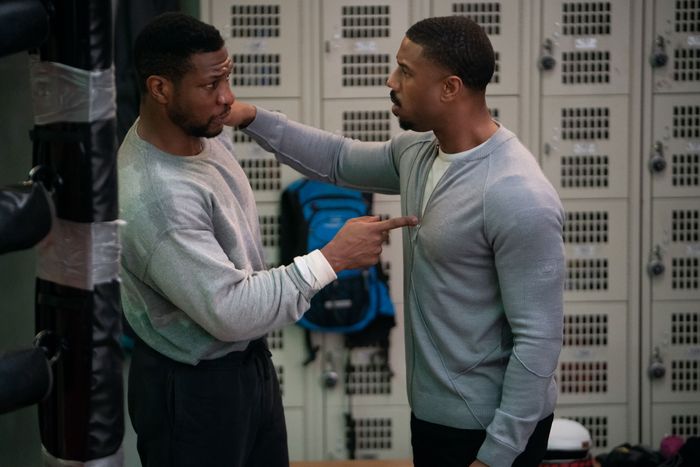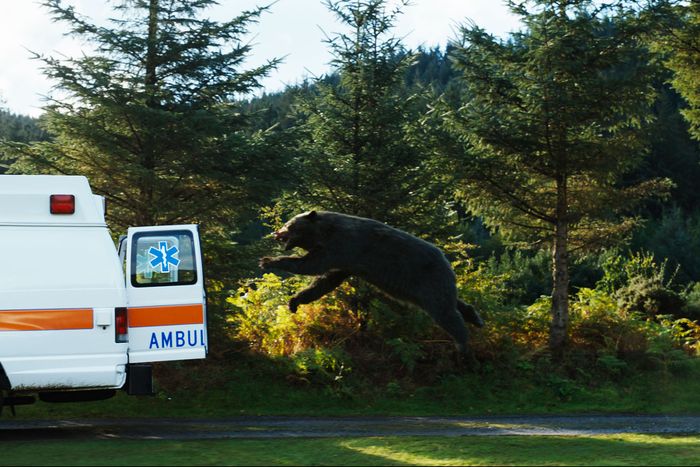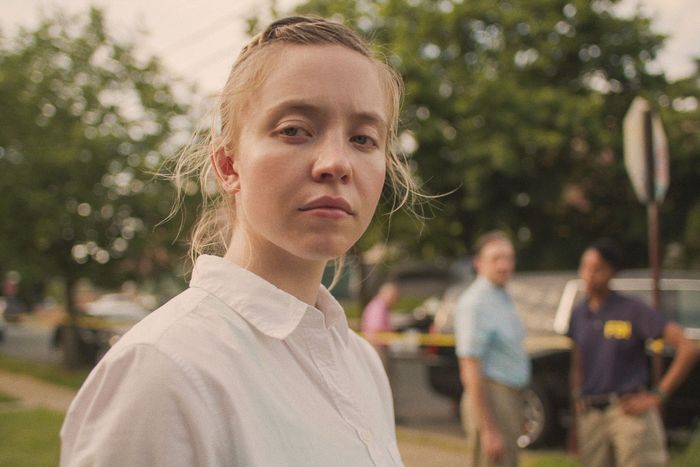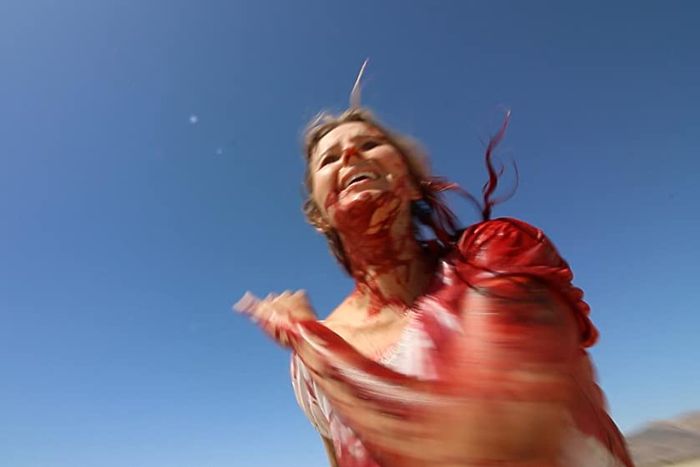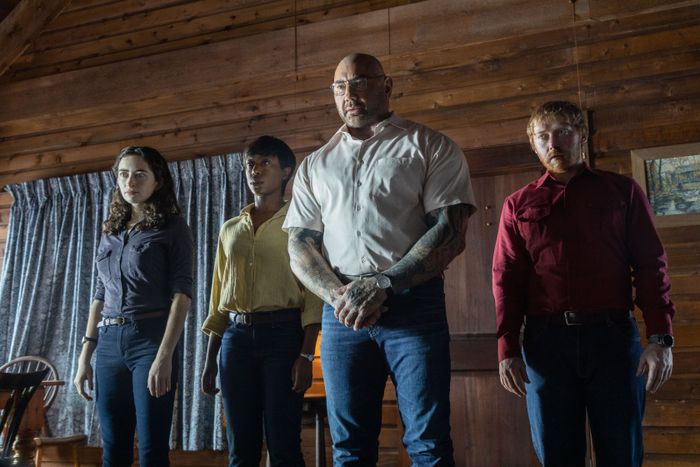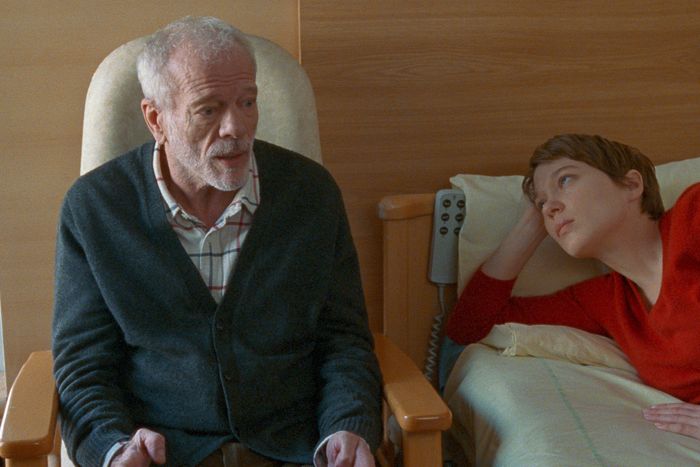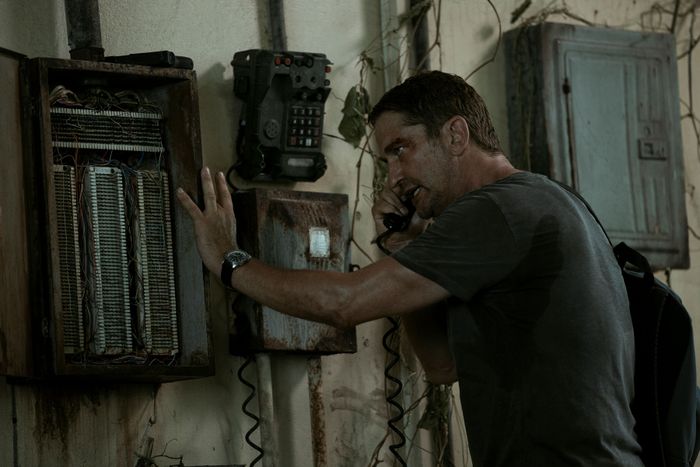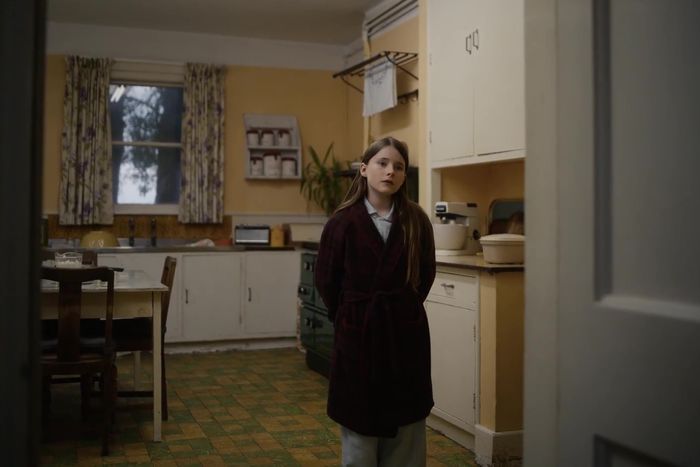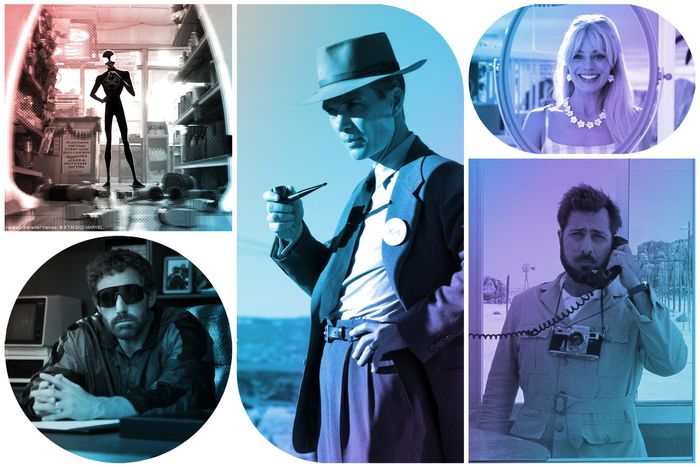
Not to trigger the ol’ existential panic, but 2023 is drawing to a close sooner rather than later. That means it’s time to tally what the year in movies has brought us. So far, we’ve seen Wes Anderson unveil what might be his masterpiece, his maddest expression yet of our human need for control. We’ve learned that the romantic comedy isn’t dead; it’s streaming on Hulu. It’s been a fantastic year for animation, too, with stunners like Suzume, the anime auteur Makoto Shinkai’s swoon-worthy latest, Hayao Miyazaki’s return, and Spider-Man: Across the Spider-Verse. (You ever weep at the sheer scope of a movie’s visual imagination before? You will!) Musicians Teyana Taylor and Park Ji-min have both proven themselves born movie stars. We even got a great Marvel movie — that increasing rarity — in James Gunn’s Guardians of the Galaxy swan song. We had Barbenheimer! Here are our favorite films of the year so far, curated by Vulture film critics Alison Willmore, Bilge Ebiri, and Angelica Jade Bastién.
All titles are listed by U.S. release date from newest to oldest.
The Boy and the Heron
It should be enough to say that Hayao Miyazaki has, in 2023, directed a new film and we get to see it. But The Boy and the Heron also happens to be wondrous and unsettling and funny, a magical adventure colored by grief and war. Mahito (voiced by Soma Santoki) may not be a direct stand-in for Miyazaki, but the two share enough childhood experiences, among them being evacuated to the countryside, to make the film feel particularly personal. Its hidden kingdom of birdmen and strange oceans, floating soul creatures and powerful girls, isn’t a friendly one, but it’s nevertheless beguiling. —Alison Willmore
Read Alison Willmore’s full review of The Boy and the Heron.
The Creator
The artificial intelligence framing is just bait — the robots in this sci-fi epic don’t actually have much bearing on our current conversations about ChatGPT. They are, instead, multifaceted metaphors for all sorts of groups that get othered, and the focus of Gareth Edwards’s unexpectedly grown-up movie is less the AIs themselves than how they’re treated by the American forces that are battling to wipe them from existence. The Creator riffs on both Vietnam War movies and Blade Runner as it sends a never-better John David Washington into a war-torn Southeast Asia to look for the woman (Gemma Chan) he loved and betrayed, never seeming sure as to what he would say if he found her. Edwards, always good with visual effects, offers up stunning, lived-in landscapes in which brutalist metal towers coexist alongside paddy fields and villages. —A.W.
Read Alison Wilmore’s full review of The Creator.
Our Body
Documentarian Claire Simon explains what she’s setting out to do at the start of the astonishing Our Body — to explore the “mostly female world” of the women’s health ward of a Parisian hospital, “treating the gynecological pathologies that weigh down on our lives, on our loves, on our hopes, on our desires.” Over the course of her almost three-hour film, she turns her camera to moments of vulnerability, sorrow, and joy as a woman records the voice of her crying newborn after giving birth alone, as a trans teenager learns he’ll have to wait until he’s 18 to go ahead with medical procedures his father refuses to consent to, and as a young woman weeps as she talks about the pain she’s started experiencing during sex with her new husband. There’s an expansive generosity to the film, and to the willingness of its subjects to allow these moments to be documented, that’s met with the same openness from Simon herself when a diagnosis means that she’s no longer just the director, but a patient herself. —A.W.
The Origin of Evil
Sebastien Marnier’s slow-boiling thriller weaves such a mood of sinister duplicity that you might want to take a shower afterward. It follows Stephane (Laure Calamy), a cannery worker with a girlfriend in prison, who reconnects with Serge (Jacques Weber), the wealthy businessman she claims is her father. Serge’s family is immediately suspicious, but it’s clear they’ve got their own designs on the man’s wealth. Everybody in this movie seems to be lying through their teeth. In less sure hands, this could have resulted in annoyance. But Marnier and his terrific cast know just how much to reveal and when. They keep us delightfully unmoored. —Bilge Ebiri
A Haunting in Venice
Kenneth Branagh’s Hercule Poirot mysteries haven’t exactly set the film world on fire, so the fact that the director-star continues to make them clearly speaks to his love for these stories and this character. In the latest, A Haunting in Venice, he forsakes the swooping cameras and epic vistas and frantic pacing of the previous films for something stranger, more insular, and maybe even more refined. He takes Agatha Christie’s little-discussed 1969 novel, Hallowe’en Party, and turns it into a moody, staccato thriller about the unknown. He also takes quite a few liberties with the original along the way, transporting the story to Venice in 1947 and bringing in a supernatural undercurrent. This allows for some jump-scares, but it also makes Poirot more intriguing: His refusal to believe in matters of the spirit isn’t just due to his devotion to science and reason — it’s also a measure of his brokenness. —B.E.
Read Bilge Ebiri’s full review of A Haunting in Venice.
El Conde
Pablo Larraín’s latest film presents General Augusto Pinochet, the brutal, U.S.-backed military dictator who ruled Chile from 1973 to 1990 and died in 2006 still with the blood of thousands on his hands, as a literal vampire. So, what is it? Horror? Satire? Allegory? Political thriller? Family drama? It’s got all these elements in it, but it’s also very much its own thing — an elegantly shot film whose competing tones create something delirious and new. But beneath all the genre theatrics, what comes through most vividly in El Conde are Larraín’s sadness and rage at what happened to his country. —B.E.
Read Bilge Ebiri’s full review of El Conde.
Bottoms
If anything, Emma Seligman’s follow-up to Shiva Baby could be even more anarchic, but as is, it’s a blissfully silly, unabashedly violent, and often daring time. Rachel Sennott and Ayo Edebiri are a comedy duo for the ages as PJ and Josie, lesbian outcasts who found a women’s self-defense class/fight club at their high school and accidentally create a space for feminist solidarity, though the two of them are just trying to get laid. Both are very funny, though the cast features other standouts too — like Marshawn Lynch as the club’s soon-to-be-divorced adviser and Kaia Gerber as the school’s second-most-popular cheerleader. —A.W.
Read Alison Willmore’s full review of Bottoms.
Passages
Ira Sachs’s riveting romantic drama feels as much like a horror movie as it does the story of a love triangle. Its monster is a Parisian filmmaker named Tomas, played by a perfectly magnetic Franz Rogowski, who impulsively strikes up a relationship with teacher Agathe (Adèle Exarchopoulos) despite being married to print-shop owner Martin (Ben Whishaw). Tomas serves as a spectacle that’s impossible to look away from as he strives to keep his lovers on the hook while giving neither the relationship they really want. But it’s Agathe and Martin who provide Passages with its heart, as they weather terrible treatment from the man they love under the barest guise of sophisticated sexual mores. It’s not Tomas that Sachs is trying to figure out, but why two very sensible people would be drawn to him. —A.W.
Read Alison Willmore’s full review of Passages.
The Beasts
In Rodrigo Sorogoyen’s absorbing, suspenseful drama, a French couple attempt to start an organic farm and rehabilitate a desolate stretch of property in a rural Spanish village. But the locals, who are trying to sell their land off for development by a wind energy company, see the couple as stuck-up foreigners trying to prevent them from making money and leaving this place. Sorogoyen might give lip service to the economic realities underlying the land dispute, but he’s also not afraid to take sides and to entertain. As the growing hostility between the man and woman and their neighbors eventually reaches Straw Dogs-esque proportions, it becomes clear the director wants to make us feel his protagonists’ growing helplessness and the gnawing tension of living right next door to people who might genuinely want to kill you. —Bilge Ebiri
Oppenheimer
Christopher Nolan’s portrait of the creation of the atomic bomb is a towering achievement, a tragedy writ so large that it had to be shown in IMAX. Oppenheimer sprawls across three dialogue-heavy timelines in a way that verges on unwieldy, and yet somehow it doesn’t just work, it’s devastating. Nolan’s technical virtuosity is at its showiest in the Trinity test sequence, where the first bomb unfurls in a truly unsettling, awe-inspiring spectacle, but what holds the film together are its performances — Cillian Murphy as the aloof, brilliant, and blinkered J. Robert Oppenheimer, and what feels like every character actor in the world filling out the parts of his colleagues, collaborators, and enemies. —A.W.
Read Alison Willmore’s full review of Oppenheimer and Bilge Ebiri’s explanation of the ending with Christopher Nolan.
Barbie
Directed and co-written by Greta Gerwig, Barbie has become a Rorschach inkblot purity test about feminism, womanhood, and the state of the industry itself. Is Barbie feminist or is it merely a marker of capitalism’s cunning, taking the emblems but not of the soul of the feminist movement? Is it just a slick toy commercial or is it actually reckoning with the cultural weight of Barbie with wit? I think the truth is rather complex, making Barbie operate as a woman’s picture, a feminist argument, and film defined by its delirious interest in the pleasure principle. No matter where you’ve drawn your lines on this cultural battlefield, it is hard to deny that Barbie is fun as hell. Led by star-producer Margot Robbie, Barbie is a pink funhouse brimming with glittering dance numbers, heartfelt monologues, and a genuine curiosity about not just womanhood but humanity itself. Everyone in the cast brings their A-game. Ryan Gosling undoubtedly has the boldest performance as the yearning himbo Ken, whose entire existence is in service of basking in Barbie’s warm gaze. Issa Rae and Hari Nef are equal delights for some deranged line readings alone. America Fererra is the stealth MVP for her juicy monologue that extols the constrictions on women. Robbie cements her position as a true new star in Hollywood’s firmament by helping craft a film that has a capacious curiosity and joyful aesthetics that speak toward the wild, yearning nature of being alive. —Angelica Jade Bastién
Read Alison Willmore’s full review of Barbie and Allison P. Davis’ essay about Greta Gerwig’s films.
They Cloned Tyrone
Juel Taylor’s genre-bending directorial debut is a vibrant, snappy melding of sci-fi concepts, social commentary, and blaxploitation homage, with John Boyega, Jamie Foxx, and Teyonah Parris starring as broadly drawn types — a drug dealer, a pimp, and a sex worker — who discover that the seemingly inescapable patterns of their lives in a neighborhood called the Glen aren’t accidental and are actually the result of a government conspiracy. With so many Netflix original movies these days feeling like algorithmic filler, They Cloned Tyrone is the rare offering that doesn’t just feel like it’s made by a person, but by someone with an eye for visual, a distinctive voice, and a sharp sense of humor. —A.W.
Afire
Forest fires rage in the distance in Christian Petzold’s entrancing film, which doesn’t stop its characters — novelist Leon (Thomas Schubert), photographer Felix (Langston Uibel), seasonal worker Nadja (Paula Beer), and rescue swimmer Devid (Enno Trebs) — from flirting and fighting over shared meals outside the beach house that’s Afire’s primary setting. Throughout the film, it’s Leon’s tetchiness over the failings of his second manuscript that threaten to derail the seaside idyll, but the potential for more serious danger always lurks in the background. The wonder of Petzold’s work is that it revels in the unblemished youthfulness of its characters while allowing that, in order to make great art, it helps to have endured some pain. —A.W.
Read Alison Willmore’s full review of Afire.
The Deepest Breath
Free-diving — trying to reach record depths by simply holding your breath and diving as far as you can — is one of the deadliest sports on the face of the Earth, and Laura McGann’s documentary has quite a challenge: How to tell its story without feeling like it’s exploiting a potential tragedy. The film opens with champion Italian diver Alessia Zecchini blacking out at the end of one of her dives, then flashes back across the years to show her love for the sport and her rise to the top, all the while interweaving the story of Stephen Keenan, an Irish free diver who eventually became an expert safety diver and coach. Those familiar with the story will know where it’s all headed. Others — that would be most viewers, probably — will wonder how these two lives will ultimately intersect. Documentary purists who balk at movies hiding real-life tragedies from their viewers until the end will probably break out in hives. But McGann doesn’t really hide the nature of her story. It’s clear pretty early on that we’re watching something harrowing. This is, ultimately, an elegant and deeply moving picture. —B.E.
Mission: Impossible — Dead Reckoning Part One
The latest Mission: Impossible movie, as suggested by that ominous “part one,” seems to care a bit more about its plot than previous entries, and it’s not hard to see why. This time, Tom Cruise’s Ethan Hunt isn’t fighting nihilistic terrorists or vaporous international-espionage networks but an all-powerful artificial intelligence known as “the Entity,” a variation on the man-versus-machine theme that Cruise pursued in last year’s Top Gun: Maverick. It’s also a rather compelling metaphor for the actor’s well-publicized dedication to old-school action film–making and real-life stunt work. But if Dead Reckoning spends a bit too much time slowly (and repeatedly) spelling out what the Entity is and what it can do and why that’s capital-B Bad, it can be forgiven, because all that exposition serves as a kind of spiritual justification for the bravado on display. And the film is filled with amazing action setpieces, including the star’s much-publicized, death-defying motorcycle-parachute jump over — or rather into — an immense Norwegian canyon, as well as the most hair-raising train derailment ever put to film. Whenever it gets down to the business of making Tom Cruise run and jump and drive and fly in and out of things, Dead Reckoning manages to astonish. —B.E.
Read Bilge Ebiri’s full review of Mission: Impossible — Dead Reckoning Part One and Jason Bailey’s ranking of the best action sequences in the entire M:I franchise.
Indiana Jones and the Dial of Destiny
Despite the spectacle of an effectively de-aged Harrison Ford walloping Nazis atop a train during World War II in its opening scenes, James Mangold’s film isn’t about the young Indiana Jones but about the aging and rather pathetic Dr. Henry Jones, now on the verge of retirement from teaching archaeology to sleepy Hunter College students, drinking himself silly in a grubby New York apartment. Into his life enters his goddaughter Helena Shaw (Phoebe Waller-Bridge), the adventurous offspring of an old colleague, to drag him along on a chase for a contraption that can predict fissures in the very fabric of time, thereby allowing travel into the past. Not unlike The Force Awakens did with the original Star Wars, the Dial of Destiny feels at times like a remix, offering variations on elements from earlier Indiana Jones movies. Mangold may not have the young Steven Spielberg’s musical flair for extravagant action choreography (who does?), but he is a tougher, leaner director, using a tighter frame and keeping his camera close. That may shortchange the escapist atmosphere and evocative exotica of the material, but it does bring a ground-level immediacy to the action. Plus, all the vehicular mayhem probably suits this older, slower version of Indy, who fights less but often finds himself in the middle of any number of “wouldn’t it be cool if” chases: motorcycles and tuk-tuks and trains and Jaguars and horses and planes in all manner of arrangements and rearrangements, as well as one delirious final sequence that had me giggling with delight. No, it’s not Raiders of the Lost Ark; no movie is. But it’s too entertaining to dismiss. —B.E.
Read Bilge Ebiri’s full review of Indiana Jones and the Dial of Destiny.
Asteroid City
Snarky memes notwithstanding, Wes Anderson’s obsessively constructed dioramas are about our very human need to organize, quantify, and control our lives in the face of the unexpected and the uncertain. His latest might be the purest expression of this dynamic because it’s about the unknown in all its forms. Death, the search for God, the creation of art, the exuberance of love, the mysteries of the cosmos — in Anderson’s telling, they’re all facets of the same thing. The film takes place in September 1955, at a mid-century moment when everything seemed possible. Bold curiosity is in the air, as the titular dead-end desert town has been overrun by a group of teens and their families who have gathered for a contest thrown by the U.S. military and the local observatory. At the same time, we’re told that what we’re watching is really a theater piece performed for television, also in 1955, at a moment when the work of the Actors Studio was transforming Hollywood and craft and discipline were taking a back seat to the animating secrets of the soul. The audacity and beauty of Asteroid City lie in the way it connects the mysteries of the human heart to the secrets of science and the universe. There has always been a method to Anderson’s madness, but this film reminds you that there is also a madness to his method. And that is what makes him a great artist. —B.E.
Read Bilge Ebiri’s full review of Asteroid City and Matt Zoller Seitz’s revealing tour of Wes Anderson’s office.
Scarlet
Pietro Marcello’s previous feature, 2020’s brilliant Martin Eden, was an ambitious adaptation that attempted to graft a Jack London novel onto the entire history of the 20th century. With Scarlet, he works in a gentler register, though the ambition is still there. In its opening scenes, a gruff, quiet man, Raphaël (Raphaël Thiéry), returns from World War I to discover that his wife is dead and that he has a young daughter. He and the girl live with a group of women who are outcasts from the community, and he soon becomes an outcast as well. This rough man’s daughter (played as a young woman by Juliette Jouan) turns out to be the most delicate of creatures, a romantic young woman with a connection to the divine. This beguiling film has the cadences of a fairy tale — prophetic visions, magical coincidences, behavior echoed across the years — but Marcello, who came up through the documentary world, expertly blends the immediate and the airy. —B.E.
Blue Jean
Georgia Oakley’s feature debut is an anguished look at life in the closet set in Northeast England in 1988 — the year the Thatcher administration introduced a set of laws banning the “promotion of homosexuality” in the name of protecting children. Jean, played by a terrific Rosy McEwen in her first leading role, has painstakingly compartmentalized her existence. At night, she hangs out at a lesbian bar with her girlfriend, Viv (Kerrie Hayes), a part of herself she keeps secret from her co-workers and students at the school where she works as a gym teacher in the day. Blue Jean is a moody, delicately wrought film about how Jean, damaged from past experiences and her own internalized homophobia, is unable to feel like she belongs in either of the worlds she created for herself. The justification for the impending legislation in the background of the film may sound all too familiar, but Blue Jean’s real power comes from its examination of the human costs of living in fear. —Alison Willmore
Spider-Man: Across the Spider-Verse
Not to be corny, but I teared up a few times during the opening scenes of this sequel to 2018’s Into the Spider-Verse just from how good it all looked. Somehow, the animation is even more impressive and imaginative, as the film gives us new universes done in soft watercolors and futuristic detail while also returning us to the embrace of the vibrant, comic-book-art–inspired Brooklyn that its teenage hero, Miles Morales (Shameik Moore), inhabits. Across the Spider-Verse ends on a to-be-continued, but it’s hard to complain about that when it’s so rich with detail and so beautifully crafted — a riff on multiverse storytelling that also becomes a heartfelt exploration of parenting and accepting that growing up means that your child is going to encounter pain you can’t shelter them from. —A.W.
Read Alison Willmore’s full review of Spider-Man: Across the Spider-Verse and Richard Newby’s explanation of the cliff-hanger ending.
Night of the 12th
Based on a real-life case, Dominik Moll’s thriller follows the lengthy investigation into the grisly burning death of a young woman in a small town near Grenoble. An opening title informs us that this was but one of many unsolved murders in France, a disquieting bit of information with which to kick off a mystery, telling us there won’t be a final solution to the case. This subtly draws our attention to other aspects of the story: to the interactions among the cops investigating the case, to the humdrum bureaucracy of police work, and to a general feeling of haunted desolation in this provincial area nestled next to the French Alps. The film won six awards at this year’s César Awards, including Best Picture, Director, and Screenplay, but there seems to be very little buzz around its U.S. release. Even so, it feels major, with an unsettling mood that recalls such previous policier masterpieces as David Fincher’s Zodiac and Bong Joon Ho’s Memories of Murder. Its real-world mysteries eventually become existential ones, but the movie never stops sending chills up your spine. —B.E.
Read Bilge Ebiri’s full review of Night of the 12th.
BlackBerry
As the ultracorporate “shark” Jim Balsillie, Glenn Howerton is a near-comical vision of drive and animalistic ambition, and his character turns out to be just who the clumsy, introverted nerds who founded Research in Motion (RIM), the tiny company that would transform the cell-phone industry, need to make their harebrained schemes reality. Directed by Matt Johnson, BlackBerry basically presents the rise of the smartphone as a sitcom pitch: What happens when two affable, not-ready-for-prime-time dorks from Waterloo, Canada — brilliant engineer Mike Lazaridis (Jay Baruchel) and his can-do cheerleader pal Doug Fregin (Johnson) — are joined by a crisply suited, Harvard-educated, phone-smashing apex predator. One of the great pleasures of BlackBerry is watching Balsillie’s befuddled, running disgust at Lazaridis and Fregin’s hapless ways, at the chaotic ineptitude of their finances, their utter lack of business sense, and their go-along-to-get-along management style. I would happily watch several seasons of these three going at it. —B.E.
Read Bilge Ebiri’s full review of BlackBerry.
Guardians of the Galaxy Vol. 3
James Gunn not only has technical proficiency and a sense of humor, he also seems to possess those talents that once made George Lucas so exciting: the ability to effortlessly jump between worlds and the shorthand to explain elaborate and fantastical plot points. He is also unafraid of clichés, relishing the opportunity to put new spins on familiar products — a perfect showman for the IP era. For his third (and likely final) entry in Marvel’s Guardians of the Galaxy sub-franchise, Gunn tempers the freewheeling action and goofy comedy with cutaways to the tear-jerking origin tale of Rocket Raccoon, adding a pall of doom over the otherwise lively proceedings. Rocket, we learn, was once just a silent, sad-eyed little guy plucked out of a pen filled with other baby raccoons and experimented upon by a megalomaniacal scientist. The flashback structure invests the film’s central narrative with emotional power. The picture also reconnects with the sense of wonder that once made comic-book movies so captivating. Job No. 1 for people who make movies like this is probably to convey your own unfettered enthusiasm to the audience. Guardians 3 may not be particularly original, but it’s also rarely cynical or opportunistic. At a time when comic-book fare has increasingly become the most wearying corner of the cinematic firmament, that is quite an accomplishment. —B.E.
Read Bilge Ebiri’s full review of Guardians of the Galaxy Vol. 3 and Siddhant Adlakha’s explanation of the ending.
Sisu
This is a largely wordless World War II thriller about a grizzled, haunted loner who strikes a massive vein of gold in the remote reaches of Lapland, only to find himself tormented by a platoon of retreating Nazis. The year is 1944, and the war is basically lost for the Germans, who are laying waste to everything in their path. As the Nazis chase him, our hero picks them off, sometimes individually and sometimes en masse. What keeps it from being repetitive and predictable is director Jalmari Helander’s increasingly creative ideas about how his hero should go about wasting the Nazis in his path, as the film graduates from humble head stabbings and limb snappings to more ambitious and explosive mayhem. So much so that it all starts to border on a philosophical treatise about survival and perseverance. Some will say Sisu recalls Mad Max: Fury Road or Inglourious Basterds, but I kept imagining it as what might have happened had Sergio Leone been alive to direct Crank: High Voltage. —B.E.
Read Bilge Ebiri’s full review of Sisu.
The Eight Mountains
Like the characters in Brokeback Mountain, the men in this drama from Felix van Groeningen and Charlotte Vandermeersch bond during an Edenic summer in the wilderness, and while their relationship is platonic, the film is no less a love story. Pietro (Luca Marinelli) and Bruno (Alessandro Borghi) are childhood friends who reunite as adults to build a cabin up in the mountains where Bruno grew up and Pietro’s family used to spend the summers — a breathtaking location that becomes a place the two return to as the years pass. The Eight Mountains offers all sorts of ecstatically beautiful footage of the Italian Alps, but it also spins out a delicate, rueful story about trying to find a balance between nature and work, as its two characters take divergent routes in their search for a meaningful life. —A.W.
Quasi
The comedy troupe Broken Lizard met at Colgate back in 1989 and never spiritually left college. Thank God for that. Their work still feels like a group of amiable stoners from across the hall came up with a bunch of dumb, funny ideas to put into a movie and then filmed it all the following morning. A riff on The Hunchback of Notre Dame, Quasi may be their first period piece, but it’s basically the same vibes-based silliness. Steve Lemme plays Quasimodo, a torture-chamber employee who gets caught in a petty but murderous tiff between the pope and the king. One can easily imagine a version of this movie where the plot is handled with urgency, authenticity, and suspense, but then what would you be left with? The Broken Lizard guys understand that their brand of handmade, good-natured humor doesn’t really work with tighter storytelling or sharper acting, and they’ve honed their approach well over the years. They’re always winking at us because they know theirs is a fundamentally participatory style of comedy; the process is part of the joke. They keep making cult movies so that when you watch them, you feel as if you were there when they made them. Broken Lizard is all of us. —B.E.
Read Bilge Ebiri’s full review of Quasi and a transcript of Vulture Festival’s Broken Lizard panel.
Suzume
Makoto Shinkai’s latest is another of the openhearted romantic fantasies he’s so good at, a road-trip adventure about an orphaned teenage girl who helps save Japan from a mythical worm whose intrusions into our world cause massive earthquakes. But despite featuring both a mysterious love interest and a talking cat, Suzume is a more pensive affair than it first appears, one that reflects what it means to come of age when the future feels so uncertain. Suzume (Nanoka Hara) and her companion, Souta (Hokuto Matsumura) — a dreamboat who, hilariously, spends most of his time magically transformed into a three-legged chair — cross the country trying to close up portals that open in areas that have been abandoned because of disasters or the shrinking population, as though patching up the tears in a social fabric that’s wearing thin all over. It’s a swoony, gorgeously animated movie that earns its sadness as well as its ecstatic bursts of hope. —A.W.
Read Alison Willmore’s full review of Suzume and Rafael Motamayor’s interview with Makoto Shinkai.
Sick of Myself
It’s possible that no scene this year will be more entertaining than the one in which Signe (Kristine Kujath Thorp), a Norwegian woman with a pathological need to be the center of attention, lies to the chef at a fancy dinner about having severe nut allergies, then forgets she said that and eats something with nuts while the whole table looks on in horrified expectation. But then, all of this Kristoffer Borgli movie is like that — a bitterly funny black comedy about narcissism and the paths people attempt to take to fame. When Signe’s boyfriend, Thomas (Eirik Sæther), rises thanks to a dubious artistic career involving stolen furniture, Signe retaliates by taking a recalled Russian drug whose side effects include a horrifying skin condition. The perfectly paired sociopaths ricochet through Oslo as though each is involved in their own elaborate stunt that never actually ends. —A.W.
Air
Air, Ben Affleck’s enormously entertaining corporate drama about Nike’s efforts to sign Michael Jordan, might seem at first like a ridiculous idea for a movie, but it is in fact an ingenious one. The creation of the Air Jordan sneaker changed pop culture forever, and Jordan’s unprecedented profit-sharing deal with Nike would give athletes equity in the products they were being used to sell. The film situates the Air Jordan as a product of the runaway consumerism of the 1980s, but it also hints at a boundless, complex new world coming into view. In what will surely go down in history as one of the great sports-movie speeches, Sonny Vaccaro (Matt Damon), the executive in charge of the shoe company’s basketball outreach, makes the point to Michael himself that the player practically exists outside of space and time. “Everyone at this table will be forgotten,” he says, noting all the executives gathered around them. “Except for you.” —B.E.
Read Bilge Ebiri’s review of Air, Chris Lee’s behind-the-scenes story about screenwriter Alex Convery, and Derek Lawrence’s interview with actor Chris Messina.
A Thousand and One
A.V. Rockwell’s directorial debut is a novelistic New York movie spanning 11 years in the life of Inez (a revelatory Teyana Taylor) as she fights to make a life for herself and her son, Terry. The film begins with Inez grabbing a 6-year-old Terry out of foster care not long after she’s released from Rikers, but rather than tell the story of life on the run, Rockwell opts for something richer and more expansive — the saga of how a woman with no experience of what a stable home is like manages to create one through sheer force of will in a changing city that’s increasingly hostile to people like her. —A.W.
Read Alison Willmore’s review of A Thousand and One.
Dungeons & Dragons: Honor Among Thieves
In attempting to turn the classic fantasy role-playing game into a franchise picture, directors John Francis Daley and Jonathan Goldstein somehow manage to play to the base while acknowledging the inherent ridiculousness and impenetrability of the concept. Their film is filled with medieval derring-do, unpronounceable fantasyspeak, and what I can only assume is a cornucopia of nerdtastic Easter eggs. But it’s also hilarious, with a game cast led by Chris Pine, a leading man who has turned making fun of his own leading manness into an art form. The film’s set pieces are built around comedy, with bits of (cleverly choreographed and directed) action to add some urgency, not the other way around. And the humor actually helps to up the suspense. Honor Among Thieves is the work of filmmakers who understand that the best way to take stuff like this seriously is not to take it seriously at all, and to have fun with it. —B.E.
Read Bilge Ebiri’s review of Dungeons & Dragons: Honor Among Thieves.
John Wick: Chapter 4
John Wick: Chapter 4 is blissfully entertaining, full of pratfalls and acting turns that make audiences swell with oohs, aahs, and yelps. It’s far more narratively focused than its previous sequels, while still managing to globe-trot a behemoth cast à la Chapter 2 and Chapter 3. Here, John Wick (Keanu Reeves) seeks to finally buy his freedom by dueling the Marquis (Bill Skarsgård). I have some reservations about the narrative choices, but the cinematic violence of Chapter 4 brought me the joy and erotic rush that has long powered the series. It synthesizes the zaniness of Looney Tunes and gags of Buster Keaton with martial-arts master classes that call back to the career of Jackie Chan and learn from more recent films like 2017’s South Korean action flick The Villainess. It’s a history lesson on what the body can do onscreen — its limits and its wonders. —A.J.B.
Read Angelica Jade Bastién’s review of John Wick: Chapter 4, Chris Lee’s interview with filmmaker Chad Stahelski, and Bilge Ebiri’s analysis of the movie’s ending.
The Lost King
This is the lightly fictionalized (and amazing) story of amateur historian Philippa Langley (Sally Hawkins), who in 2012 helped lead an archaeological expedition that dug up a nondescript Leicester car park and unearthed the remains of the notorious King Richard III. The bulk of the film tells of how Philippa came to be fascinated by the disgraced medieval monarch and fought not just to find his grave but also to counter the prevailing villainous narrative about him, which may well have been the work of Tudor propagandists. There’s an interesting tension in the film, between the exaltation of royal power on the one hand — a spiritual belief in the magic of lineage, itself dating back to arcane notions of divine right — and, on the other, the ennobling of common individuals, of ordinary people like Philippa as they butt heads with city councils and university administrators and academic mossbacks. The very act of reclaiming Richard’s legacy from his now-gone Tudor rivals puts the lie to the very idea of royalty, of bloodlines, and the eternal question of who gets to have power over whom. —B.E.
Read Bilge Ebiri’s review of The Lost King.
Tori and Lokita
The latest from award-winning, veteran Belgian realists Jean-Pierre and Luc Dardenne follows two African migrants in Belgium: 17-year-old Lokita (Joely Mbundu) and her 11-year-old “brother,” Tori (Pablo Schils). They’re not actually siblings. They’re not even from the same country. But they’ve formed an almost mystically strong bond ever since they met during their crossing to Europe and have now become inseparable. For all the sensitivity and sobriety of their work, what has made the Dardennes such effective filmmakers has been the subtle way they insert genre elements into their dramas. Each movie could be thought of as a thriller — often involving characters racing against the clock, entering places they mustn’t, or crossing people they shouldn’t. This one is no different: Tori and Lokita work for pennies at an Italian restaurant, singing songs for the customers, then dealing drugs all over the city for the joint’s owner so they can make money to send to Lokita’s family back home and to the smugglers that brought them here. These two kids are surrounded by cruelty, indifference, and suspicion, but their relationship also allows us to feel some hope. It also means that the film becomes ulcer-inducingly unbearable once things truly start to spin out of control. —B.E.
Read Bilge Ebiri’s review of Tori and Lokita.
Walk Up
This cleverly constructed comedy from Hong Sang-soo takes place entirely in a small Seoul apartment building that provides not just the setting for the movie, but its structure. Byung-soo (Hae-hyo Kwon) is an acclaimed filmmaker paying a visit to the building’s owner, an old friend named Ms. Kim (Lee Hye-young) who soon realizes he has ulterior motives. But what follows are sly episodes that take Byung-soo to each level of the building in what can be seen as glimpses of his future romantic and professional disappointments, or as forward-looking fantasies about his life as he gradually loses the status that’s key to his identity. —A.W.
Read Alison Willmore’s review of Walk Up.
Rye Lane
The romantic comedy isn’t dead, it’s strolling around South London in the company of Dom (David Jonsson) and Yas (Vivian Oparah), a pair of charming 20-somethings who end up spending the day together after a less than auspicious meet cute in the bathroom of an art gallery. Both are getting over breakups, and the joy of Raine Allen-Miller’s movie comes from the dawning realization in each, over teasing banter and some mini-adventures along the way, that they might finally be ready to open their hearts again. —A.W.
Read Alison Willmore’s review of Rye Lane.
Stonewalling
Ji Huang and Ryûji Otsuka’s bleakly funny film has you aching for its 20-year-old protagonist Lynn (Honggui Yao) as much as you also feel exasperated with her naïveté. Lynn, who’s studying to be a flight attendant, seems forever a passenger in her own life, but when she finds out she’s pregnant by her self-involved boyfriend, she opts to keep the baby in a scheme to help her mother, one of the few firm decisions we see her make. In Stonewalling’s vision of a contemporary China accelerating toward dystopia, this shifts Lynn from being commodified for her beauty to being commodified for the fetus she’s carrying, navigating an increasingly absurd fertility industry that suggests her future prospects are bleak. —A.W.
Creed III
Congrats to Michael B. Jordan for turning a creaky boxing franchise into something deliciously close to shonen anime. —A.W.
Read Alison Willmore’s review of Creed III.
Operation Fortune: Ruse De Guerre
Guy Ritchie movies should theoretically be romps, but an overbearing fussiness threatens to kneecap many of them at every turn. Here then is something genuinely charming and light-footed: An espionage comedy-thriller in which a British superspy (Jason Statham) with a fondness for the finer things in life puts together a team to infiltrate the world of a playboy billionaire arms dealer (Hugh Grant), who just happens to be obsessed with the work of an action-movie star (Josh Hartnett), who in turn also gets roped into the elaborate scheme. With plenty of action set pieces — shootouts, car chases, and acrobatic beatdowns — you could imagine this as a dry run for a James Bond film, but the humorous banter and the cast (with especially charming turns from Hartnett and Grant) place it firmly in the realm of comedy. Everybody in Operation Fortune — yes, even Guy Ritchie — seems to be having fun. Sometimes, that’s all you need. —B.E.
Read Bilge Ebiri’s review of Operation Fortune.
Cocaine Bear
Cocaine Bear is, above all else, a title and a concept, and the movie clearly understands this. Elizabeth Banks’s action-comedy-thriller is loosely based on a 1985 incident when an American black bear ingested a massive amount of cocaine and was found dead soon thereafter. The film concocts a fanciful story — a series of stories, really — out of what might happen if an enormous bear went on a savage, indestructible, coke-fueled rampage through the Georgia woods. It’s part Spielbergian kids’ adventure, part slasher flick, with an ambling, gory insouciance that might have been more off-putting in a movie not called Cocaine Bear. —B.E.
Read Bilge Ebiri’s review of Cocaine Bear, Chris Lee’s interview with director Elizabeth Banks, and Derek Lawrence’s interview with star Keri Russell.
Linoleum
Colin West’s gentle sci-fi comedy-drama plays like Interstellar remade by Wes Anderson. Jim Gaffigan gives a warm, charming performance as the host of a children’s science show who loses his job and decides to build a rocket from the remains of one that has crashed in his backyard. Meanwhile, his rebellious teenage daughter begins falling for the new kid at school, who just happens to be the troubled son of the hard-ass, go-getter astronaut who replaced our hero at his job (also played by Gaffigan, now with a sinister mustache). But as the characters’ realities begin to fray, we start to sense that there’s more to this story than what we’re seeing. It’s a moving film about time, ambition, aging, wormholes, and the all-consuming power of love. And the film’s quaint, handmade qualities help make the tears it remorselessly jerks out of you feel like honest ones. —B.E.
Reality
Playwright Tina Satter, in her directorial debut, turns the actual 2017 FBI interrogation transcript of the whistleblower Reality Winner into a fascinating thriller that toggles between the mundane and the terrifying. As the 25-year-old Winner, Sydney Sweeney gives an incredible performance that plays out in micro-expressions, presenting a calm façade while giving us flashes of a woman gradually grasping how dire her situation is. Josh Hamilton and Marchánt Davis play FBI agents whose attempts at small talk are betrayed by ruptures — like a refusal to let Winner touch her phone when explaining how to access its contents — that show off the seriousness of the protocol they’re following. It’s a brutally effective dose of all-too-real dread. —A.W.
Read Alison Willmore’s full review of Reality.
The Outwaters
Skinamarink wasn’t the only micro-budget horror movie to become an online phenomenon earlier this year. Robbie Banfitch’s found-footage film about a desert excursion gone wrong is just as refreshing and polarizing. It purports to be a set of recovered memory cards from a trip that four friends make into the Mojave to shoot a music video. Banfitch’s film meanders its way with scenes of preparation and the camera-carrying main character, played by Banfitch himself, heading home to visit his mother. But the scares, when they do arrive, are unforgettably intense and disorienting, shot by Banfitch in a way that leaves you feeling unmoored from any sense of reality and bombarded with images that are alternately gorgeous and gruesome. —A.W.
Knock at the Cabin
Four strangers (led by a wonderful Dave Bautista) emerge from the woods and present a family — a young girl and her two fathers (Jonathan Groff and Ben Aldridge) — with an impossible choice: They must willingly sacrifice one member in order to avert the apocalypse. The film smoothly moves from the textures of one type of thriller to another, even as the mood remains eerily consistent. A Frankenstein opening soon gives way to a home-invasion picture, then a village-cult horror movie, and finally a disaster flick. Knock at the Cabin is based on Paul Tremblay’s 2018 novel, The Cabin at the End of the World, and the script follows the book pretty closely for the first two-thirds. Both are works of the apocalyptic imagination, but Tremblay’s tale is more insular, working the ambiguity of the situation to explore the characters’ faith and emotional perseverance. Shyamalan, however, understands that there is usually little ambiguity around such horrors in cinema; in 2023, when someone in a movie says the planet is ending, it usually is. Instead, he returns to one of the animating ideas of his early work: a profound grief at the state of the world. The result is the most exhilarating and wounding film the director has made in many, many years. —B.E.
Read Bilge Ebiri’s review of Knock at the Cabin.
One Fine Morning
Mia Hansen-Løve makes pictures that amble along with the rhythms of the everyday, about characters who never quite know what to do with themselves when they experience brief moments of happiness. She borrows odds and ends from her own life (and the lives of those around her), and reconfigures them into stories that carry the unnerving echoes of truth. In One Fine Morning, Léa Seydoux plays a widowed single mother whose philosopher father (Pascal Greggory) has been struggling with dementia. While mulling what to do with his rapidly deteriorating condition, Sandra reconnects with an old, married friend (Melvil Poupaud) and begins a heated affair. Suddenly, she finds herself deeply in need of this man’s affections — cherishing her moments with him while trying to hold off the irreparable sadness that seems to surround her. This could have easily become a torrid, tear-jerking melodrama, but Hansen-Løve’s matter-of-fact approach to performance and incident allow the emotions to emerge organically from the unfussy drama onscreen. She reminds us that beauty is often found in the mundane cadences of ordinary life. —B.E.
Read Bilge Ebiri’s review of One Fine Morning.
Plane
Plane. —B.E.
Read Bilge Ebiri’s review of Plane.
Saint Omer
Alice Diop’s stunner of a film tucks a whole fraught universe into a courtroom drama. Kayije Kagame plays Rama, an author and professor who attends the trial of Laurence Coly (Guslagie Malanda), a woman who’s been accused of killing her own baby. Rama intends to make Laurence the subject of her next book, but instead, to her fascination and sporadic horror, sees herself in the admitted murderer, especially in their shared experiences as Senegalese immigrants and receptacles of immense parental expectations. —A.W.
Return to Seoul
With his film Return to Seoul, writer-director Davy Chou grounds his story in Park Ji-min’s features and expressions. Her debut performance is so piercing it makes the entire film move like a breathing poem. Park plays Frédérique “Freddie” Benoît, a 25-year-old Korean woman adopted by a white French couple, who has returned to her ancestral home. When she visits an adoption center to find out more about her parents and realizes the organization must formally send requests to her birth mother and father, Freddie tries to remain impenetrable. But cracks in her charismatic façade become undeniable when she travels to meet her father and the family that could have been hers. There are no grand speeches, no sudden or dramatic upheavals, no twinkling score to mawkishly pull at your heartstrings. Return to Seoul carries itself with a gentle forcefulness. Where do Freddie’s wounds begin? Where does the pain of her torn identity end? It is in the grooves of Park’s beauty, the clarity of her emotion, that we come to understand Freddie’s life as a fable written upon sand. —A.J.B.
Read Angelica Jade Bastién’s review of Return to Seoul.
The Quiet Girl
It may not have won the Oscar, but Colm Bairéad’s 1980s drama about a neglected 9-year-old is a delicate marvel. Filmed entirely in Irish — a first for a Best International Film nominee — The Quiet Girl stars newcomer Catherine Clinch as the vulnerable Cáit, who’s sent away for the summer to live on a farm with distant cousin Eibhlín (Carrie Crowley) and her husband Seán (Andrew Bennett). The couple lost their own child years ago, and the film’s subdued pleasures come from the way the visit makes all three of these wounded people open up, with Cáit, pushed to the margins in her crowded home, blossoming under the attention and care she’s been craving all her life. —A.W.



